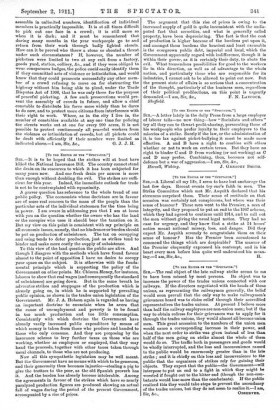[To THE EDITOR or THE " SPECTATOR."]
Sin,—It is to be hoped that the strikes will at least have killed the National Insurance BilL The country cannot stand the drain on its resources to which it has been subjected for many years now. And one fresh drain per annum is more than enough without doubling the evil. The strikes are suffi- cient for this year. Indeed, the immediate outlook for trade is not to be contemplated with equanimity.
A graver question has reference to the whole trend of our public policy. The economists whose doctrines are in favour are of more real concern to the mass of the people than the particular acts of the individual statesmen for the time being in power. I am aware in addressing you that I am at issue with you on the question whether the owner who has the land or the occupier who uses it should bear the taxation on it. But my view on this point is consistent with my principle on all economic issues, namely, that no hindrance or burden should be put on production of subsistence. The tax on occupying and using tends to deter production, just as strikes tend to hinder and make more costly the supply of subsistence.
To this view of the land question the public are alive. And though I disagree with the methods which have found favour almost to the point of opposition I have no desire to occupy your space on the subject. It is otherwise with the funda- mental principle which is supporting the policy of the Government on other points. Mr. Chiozza Money, for instance, labours to show that real wages (and consequently the standard of subsistence) are going down. But in the same breath he advocates strikes and stoppages of the production which is already going on, in which he is supported by prevailing public opinion, as shown in the trades union legislation of the Government. Mr. J. A. Hobson again is regarded as having an important doctrine to enunciate when he avers that the cause of unemployment and poverty is to be found in too much production and too little consumption. Consistently with which doctrine the Government have already vastly increased public expenditure by means of which money is taken from those who produce and handed to those who only consume. And they are proposing by the insurance scheme to levy further taxes on those who are working, whether as employers or employed, that they may hand the proceeds, together with other taxes taken through usual channels, to those who are not producing.
Now all this sympathetic legislation may be well meant. But the Government have no means with which to be generous, and their generosity thus becomes injustice—stealing a pig to give the trotters to the poor, as the old Spanish proverb has it. And the burden has already become intolerable. Among the agreements in favour of the strikes which have so nearly paralyzed production figures are produced showing an actual fall of wages during the period of the present Government, accompanied by a rise of prices. The argument that this rise of prices is owing to the increased supply of gold is quite inconsistent with the undis- puted fact that securities, and what is generally called property, have been depreciating. The fact is that the cost of production is higher because of the burdens put upon it, and amongst these burdens the heaviest and least excusable is the overgrown public debt, imperial and local, which the Government apparently regard with indifference, though it is within their power, as it is certainly their duty, to abate the evil. What tremendous possibilities for good to the workers lie in this direction, as well as of advantage to the whole nation, and particularly those wbo are responsible for its industries, I cannot ask to be allowed to point out now. But the present state of affairs is so serious that a concentration of the thought, particularly of the business men, regardless of their political predilections, on this point is urgently






































 Previous page
Previous page